Report on Entrepreneurship and Small Business in the UK
VerifiedAdded on 2020/07/23
|13
|3834
|38
Report
AI Summary
This report delves into the realm of entrepreneurship and small business management, providing a comprehensive overview of various entrepreneurial ventures, including small-business entrepreneurship, large company entrepreneurship, social entrepreneurship, and scalable start-up entrepreneurship. It examines the similarities and differences between these ventures, focusing on their impact on the UK economy. The report highlights the importance of small businesses and start-ups in fostering economic and social development, including poverty reduction and revenue generation. Furthermore, it explores the characteristics of successful entrepreneurs, exemplified by figures like Mark Zuckerberg and Richard Branson, and discusses whether these traits are innate or acquired. The report also assesses the role of personality, background, and past experiences in shaping entrepreneurial motivation and mindset, offering valuable insights into the factors that contribute to entrepreneurial success.

Entrepreneurship And Small
Business Management
Business Management
Paraphrase This Document
Need a fresh take? Get an instant paraphrase of this document with our AI Paraphraser
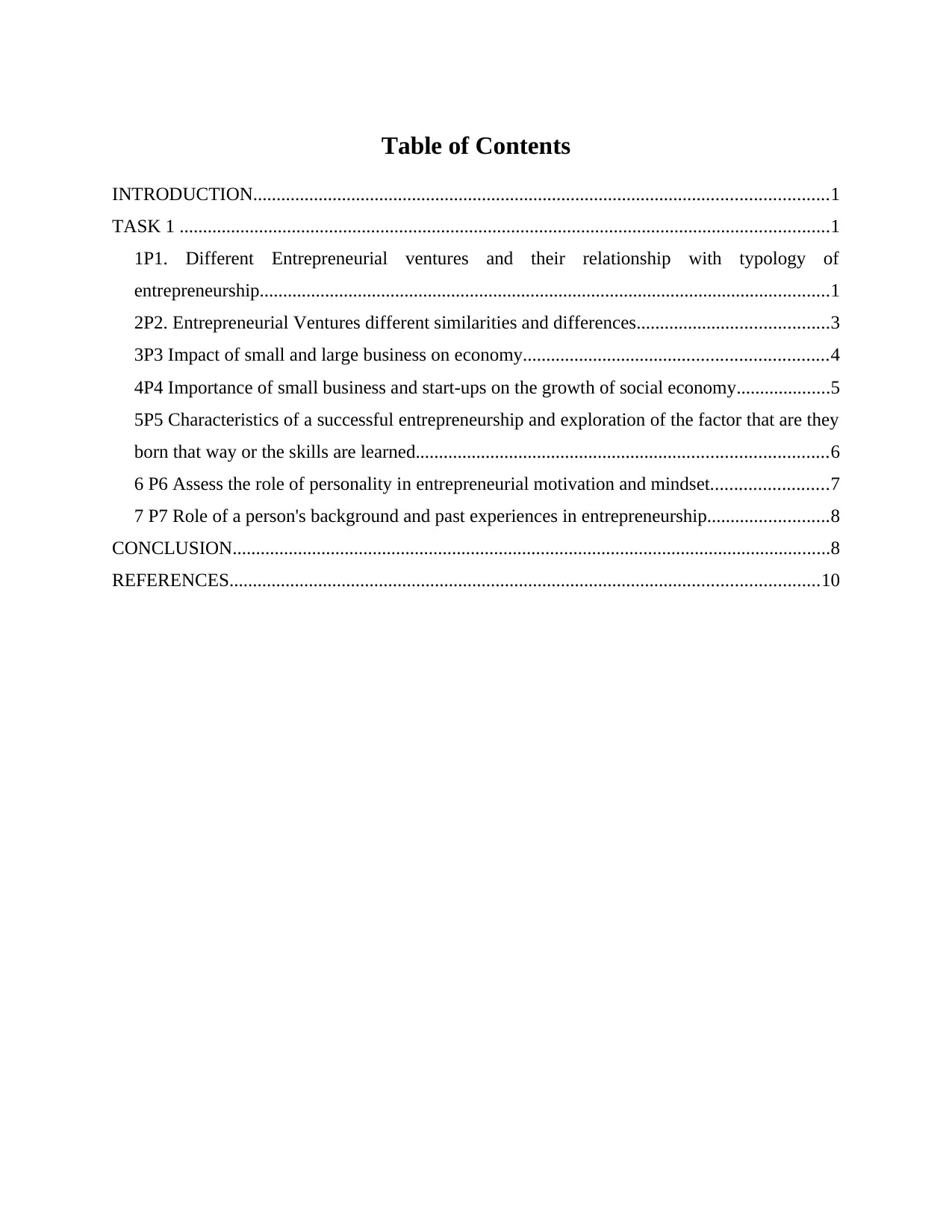
Table of Contents
INTRODUCTION...........................................................................................................................1
TASK 1 ...........................................................................................................................................1
1P1. Different Entrepreneurial ventures and their relationship with typology of
entrepreneurship..........................................................................................................................1
2P2. Entrepreneurial Ventures different similarities and differences.........................................3
3P3 Impact of small and large business on economy.................................................................4
4P4 Importance of small business and start-ups on the growth of social economy....................5
5P5 Characteristics of a successful entrepreneurship and exploration of the factor that are they
born that way or the skills are learned........................................................................................6
6 P6 Assess the role of personality in entrepreneurial motivation and mindset.........................7
7 P7 Role of a person's background and past experiences in entrepreneurship..........................8
CONCLUSION................................................................................................................................8
REFERENCES..............................................................................................................................10
INTRODUCTION...........................................................................................................................1
TASK 1 ...........................................................................................................................................1
1P1. Different Entrepreneurial ventures and their relationship with typology of
entrepreneurship..........................................................................................................................1
2P2. Entrepreneurial Ventures different similarities and differences.........................................3
3P3 Impact of small and large business on economy.................................................................4
4P4 Importance of small business and start-ups on the growth of social economy....................5
5P5 Characteristics of a successful entrepreneurship and exploration of the factor that are they
born that way or the skills are learned........................................................................................6
6 P6 Assess the role of personality in entrepreneurial motivation and mindset.........................7
7 P7 Role of a person's background and past experiences in entrepreneurship..........................8
CONCLUSION................................................................................................................................8
REFERENCES..............................................................................................................................10
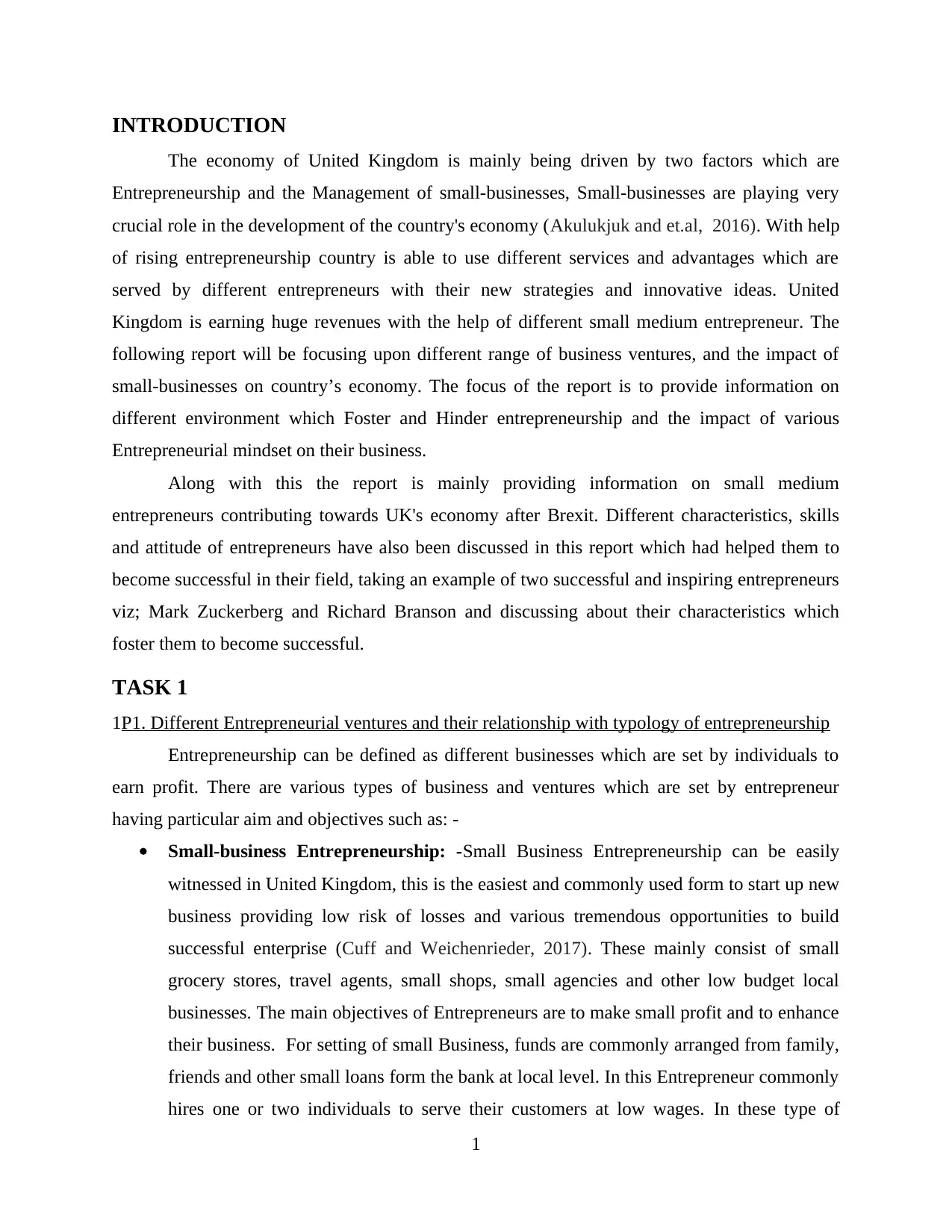
INTRODUCTION
The economy of United Kingdom is mainly being driven by two factors which are
Entrepreneurship and the Management of small-businesses, Small-businesses are playing very
crucial role in the development of the country's economy (Akulukjuk and et.al, 2016). With help
of rising entrepreneurship country is able to use different services and advantages which are
served by different entrepreneurs with their new strategies and innovative ideas. United
Kingdom is earning huge revenues with the help of different small medium entrepreneur. The
following report will be focusing upon different range of business ventures, and the impact of
small-businesses on country’s economy. The focus of the report is to provide information on
different environment which Foster and Hinder entrepreneurship and the impact of various
Entrepreneurial mindset on their business.
Along with this the report is mainly providing information on small medium
entrepreneurs contributing towards UK's economy after Brexit. Different characteristics, skills
and attitude of entrepreneurs have also been discussed in this report which had helped them to
become successful in their field, taking an example of two successful and inspiring entrepreneurs
viz; Mark Zuckerberg and Richard Branson and discussing about their characteristics which
foster them to become successful.
TASK 1
1P1. Different Entrepreneurial ventures and their relationship with typology of entrepreneurship
Entrepreneurship can be defined as different businesses which are set by individuals to
earn profit. There are various types of business and ventures which are set by entrepreneur
having particular aim and objectives such as: -
Small-business Entrepreneurship: -Small Business Entrepreneurship can be easily
witnessed in United Kingdom, this is the easiest and commonly used form to start up new
business providing low risk of losses and various tremendous opportunities to build
successful enterprise (Cuff and Weichenrieder, 2017). These mainly consist of small
grocery stores, travel agents, small shops, small agencies and other low budget local
businesses. The main objectives of Entrepreneurs are to make small profit and to enhance
their business. For setting of small Business, funds are commonly arranged from family,
friends and other small loans form the bank at local level. In this Entrepreneur commonly
hires one or two individuals to serve their customers at low wages. In these type of
1
The economy of United Kingdom is mainly being driven by two factors which are
Entrepreneurship and the Management of small-businesses, Small-businesses are playing very
crucial role in the development of the country's economy (Akulukjuk and et.al, 2016). With help
of rising entrepreneurship country is able to use different services and advantages which are
served by different entrepreneurs with their new strategies and innovative ideas. United
Kingdom is earning huge revenues with the help of different small medium entrepreneur. The
following report will be focusing upon different range of business ventures, and the impact of
small-businesses on country’s economy. The focus of the report is to provide information on
different environment which Foster and Hinder entrepreneurship and the impact of various
Entrepreneurial mindset on their business.
Along with this the report is mainly providing information on small medium
entrepreneurs contributing towards UK's economy after Brexit. Different characteristics, skills
and attitude of entrepreneurs have also been discussed in this report which had helped them to
become successful in their field, taking an example of two successful and inspiring entrepreneurs
viz; Mark Zuckerberg and Richard Branson and discussing about their characteristics which
foster them to become successful.
TASK 1
1P1. Different Entrepreneurial ventures and their relationship with typology of entrepreneurship
Entrepreneurship can be defined as different businesses which are set by individuals to
earn profit. There are various types of business and ventures which are set by entrepreneur
having particular aim and objectives such as: -
Small-business Entrepreneurship: -Small Business Entrepreneurship can be easily
witnessed in United Kingdom, this is the easiest and commonly used form to start up new
business providing low risk of losses and various tremendous opportunities to build
successful enterprise (Cuff and Weichenrieder, 2017). These mainly consist of small
grocery stores, travel agents, small shops, small agencies and other low budget local
businesses. The main objectives of Entrepreneurs are to make small profit and to enhance
their business. For setting of small Business, funds are commonly arranged from family,
friends and other small loans form the bank at local level. In this Entrepreneur commonly
hires one or two individuals to serve their customers at low wages. In these type of
1
⊘ This is a preview!⊘
Do you want full access?
Subscribe today to unlock all pages.

Trusted by 1+ million students worldwide
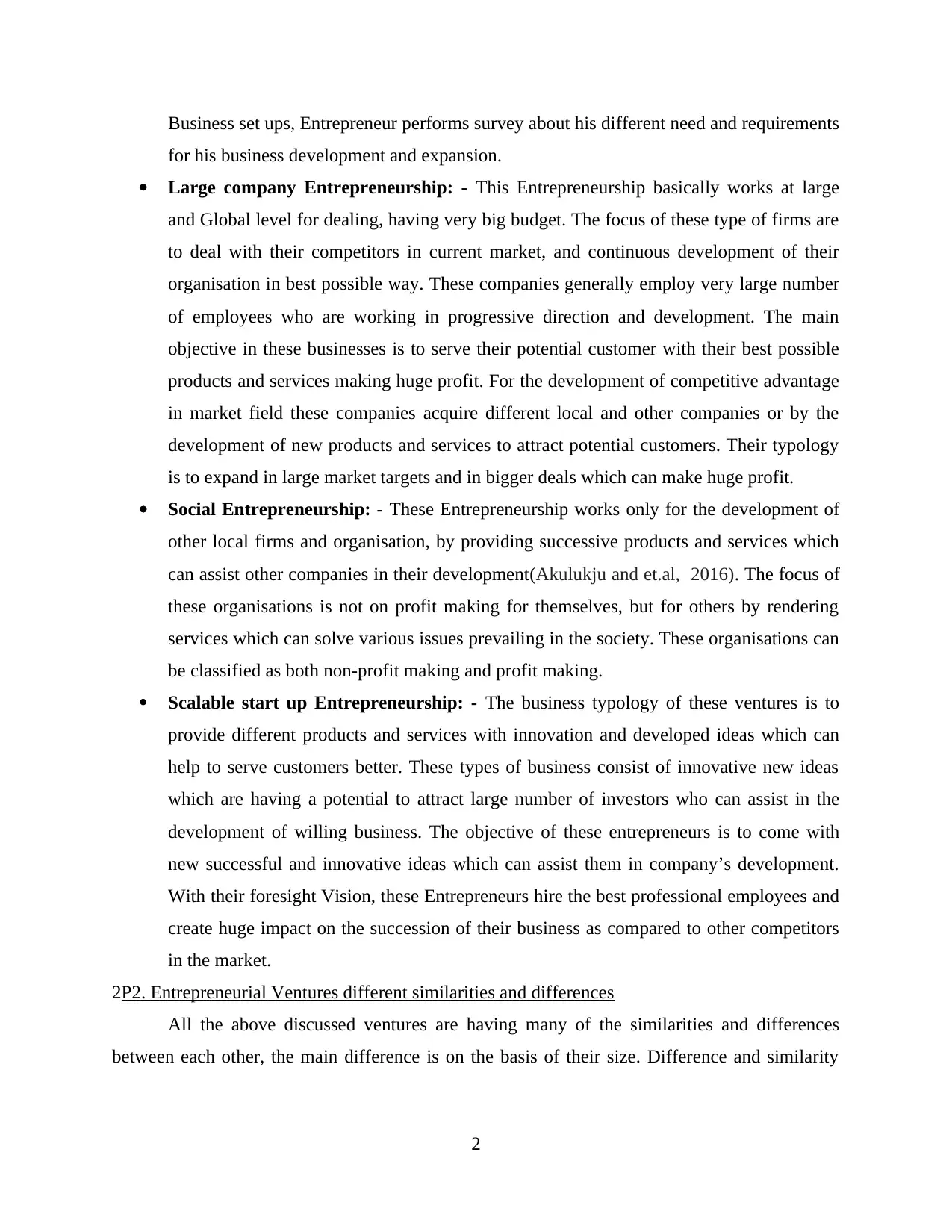
Business set ups, Entrepreneur performs survey about his different need and requirements
for his business development and expansion.
Large company Entrepreneurship: - This Entrepreneurship basically works at large
and Global level for dealing, having very big budget. The focus of these type of firms are
to deal with their competitors in current market, and continuous development of their
organisation in best possible way. These companies generally employ very large number
of employees who are working in progressive direction and development. The main
objective in these businesses is to serve their potential customer with their best possible
products and services making huge profit. For the development of competitive advantage
in market field these companies acquire different local and other companies or by the
development of new products and services to attract potential customers. Their typology
is to expand in large market targets and in bigger deals which can make huge profit.
Social Entrepreneurship: - These Entrepreneurship works only for the development of
other local firms and organisation, by providing successive products and services which
can assist other companies in their development(Akulukju and et.al, 2016). The focus of
these organisations is not on profit making for themselves, but for others by rendering
services which can solve various issues prevailing in the society. These organisations can
be classified as both non-profit making and profit making.
Scalable start up Entrepreneurship: - The business typology of these ventures is to
provide different products and services with innovation and developed ideas which can
help to serve customers better. These types of business consist of innovative new ideas
which are having a potential to attract large number of investors who can assist in the
development of willing business. The objective of these entrepreneurs is to come with
new successful and innovative ideas which can assist them in company’s development.
With their foresight Vision, these Entrepreneurs hire the best professional employees and
create huge impact on the succession of their business as compared to other competitors
in the market.
2P2. Entrepreneurial Ventures different similarities and differences
All the above discussed ventures are having many of the similarities and differences
between each other, the main difference is on the basis of their size. Difference and similarity
2
for his business development and expansion.
Large company Entrepreneurship: - This Entrepreneurship basically works at large
and Global level for dealing, having very big budget. The focus of these type of firms are
to deal with their competitors in current market, and continuous development of their
organisation in best possible way. These companies generally employ very large number
of employees who are working in progressive direction and development. The main
objective in these businesses is to serve their potential customer with their best possible
products and services making huge profit. For the development of competitive advantage
in market field these companies acquire different local and other companies or by the
development of new products and services to attract potential customers. Their typology
is to expand in large market targets and in bigger deals which can make huge profit.
Social Entrepreneurship: - These Entrepreneurship works only for the development of
other local firms and organisation, by providing successive products and services which
can assist other companies in their development(Akulukju and et.al, 2016). The focus of
these organisations is not on profit making for themselves, but for others by rendering
services which can solve various issues prevailing in the society. These organisations can
be classified as both non-profit making and profit making.
Scalable start up Entrepreneurship: - The business typology of these ventures is to
provide different products and services with innovation and developed ideas which can
help to serve customers better. These types of business consist of innovative new ideas
which are having a potential to attract large number of investors who can assist in the
development of willing business. The objective of these entrepreneurs is to come with
new successful and innovative ideas which can assist them in company’s development.
With their foresight Vision, these Entrepreneurs hire the best professional employees and
create huge impact on the succession of their business as compared to other competitors
in the market.
2P2. Entrepreneurial Ventures different similarities and differences
All the above discussed ventures are having many of the similarities and differences
between each other, the main difference is on the basis of their size. Difference and similarity
2
Paraphrase This Document
Need a fresh take? Get an instant paraphrase of this document with our AI Paraphraser
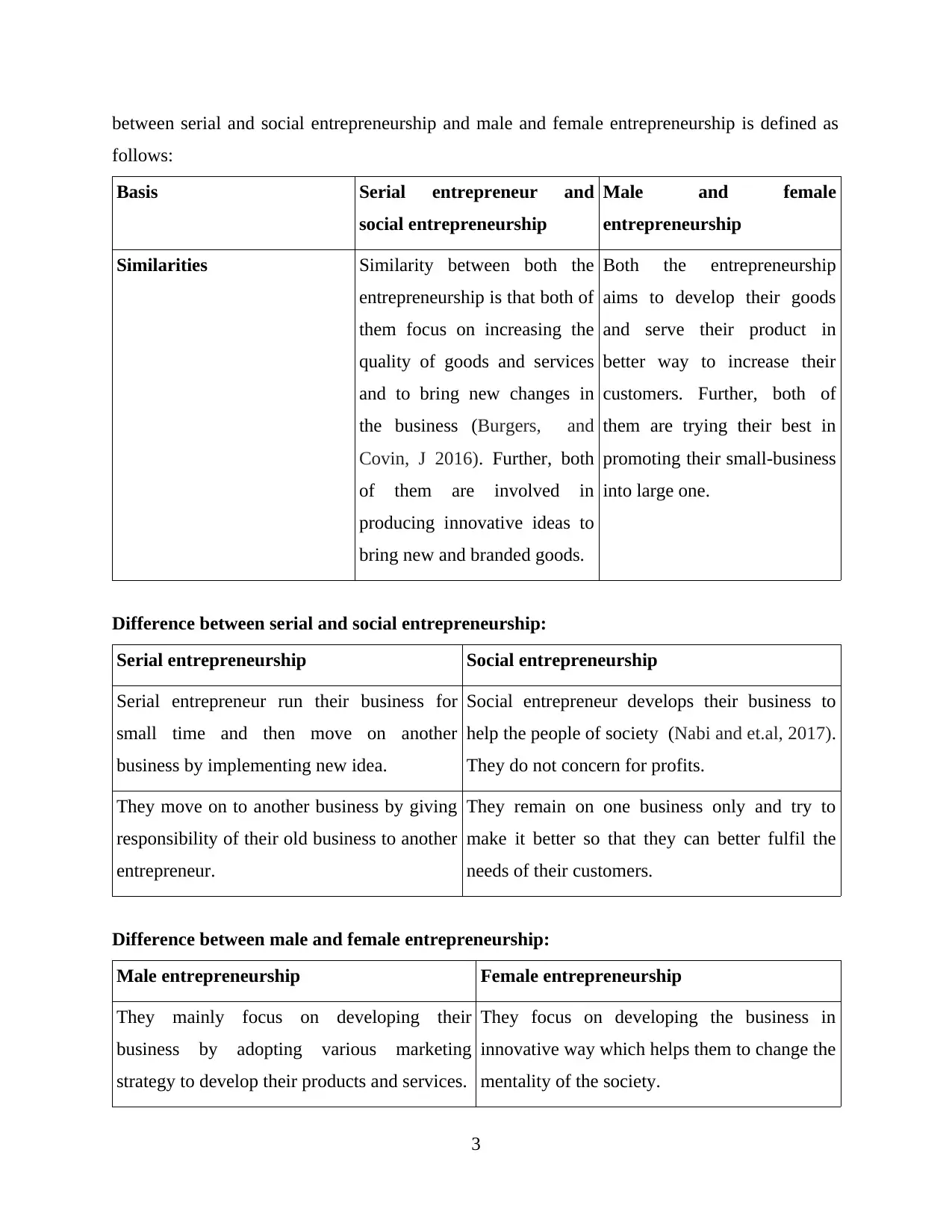
between serial and social entrepreneurship and male and female entrepreneurship is defined as
follows:
Basis Serial entrepreneur and
social entrepreneurship
Male and female
entrepreneurship
Similarities Similarity between both the
entrepreneurship is that both of
them focus on increasing the
quality of goods and services
and to bring new changes in
the business (Burgers, and
Covin, J 2016). Further, both
of them are involved in
producing innovative ideas to
bring new and branded goods.
Both the entrepreneurship
aims to develop their goods
and serve their product in
better way to increase their
customers. Further, both of
them are trying their best in
promoting their small-business
into large one.
Difference between serial and social entrepreneurship:
Serial entrepreneurship Social entrepreneurship
Serial entrepreneur run their business for
small time and then move on another
business by implementing new idea.
Social entrepreneur develops their business to
help the people of society (Nabi and et.al, 2017).
They do not concern for profits.
They move on to another business by giving
responsibility of their old business to another
entrepreneur.
They remain on one business only and try to
make it better so that they can better fulfil the
needs of their customers.
Difference between male and female entrepreneurship:
Male entrepreneurship Female entrepreneurship
They mainly focus on developing their
business by adopting various marketing
strategy to develop their products and services.
They focus on developing the business in
innovative way which helps them to change the
mentality of the society.
3
follows:
Basis Serial entrepreneur and
social entrepreneurship
Male and female
entrepreneurship
Similarities Similarity between both the
entrepreneurship is that both of
them focus on increasing the
quality of goods and services
and to bring new changes in
the business (Burgers, and
Covin, J 2016). Further, both
of them are involved in
producing innovative ideas to
bring new and branded goods.
Both the entrepreneurship
aims to develop their goods
and serve their product in
better way to increase their
customers. Further, both of
them are trying their best in
promoting their small-business
into large one.
Difference between serial and social entrepreneurship:
Serial entrepreneurship Social entrepreneurship
Serial entrepreneur run their business for
small time and then move on another
business by implementing new idea.
Social entrepreneur develops their business to
help the people of society (Nabi and et.al, 2017).
They do not concern for profits.
They move on to another business by giving
responsibility of their old business to another
entrepreneur.
They remain on one business only and try to
make it better so that they can better fulfil the
needs of their customers.
Difference between male and female entrepreneurship:
Male entrepreneurship Female entrepreneurship
They mainly focus on developing their
business by adopting various marketing
strategy to develop their products and services.
They focus on developing the business in
innovative way which helps them to change the
mentality of the society.
3
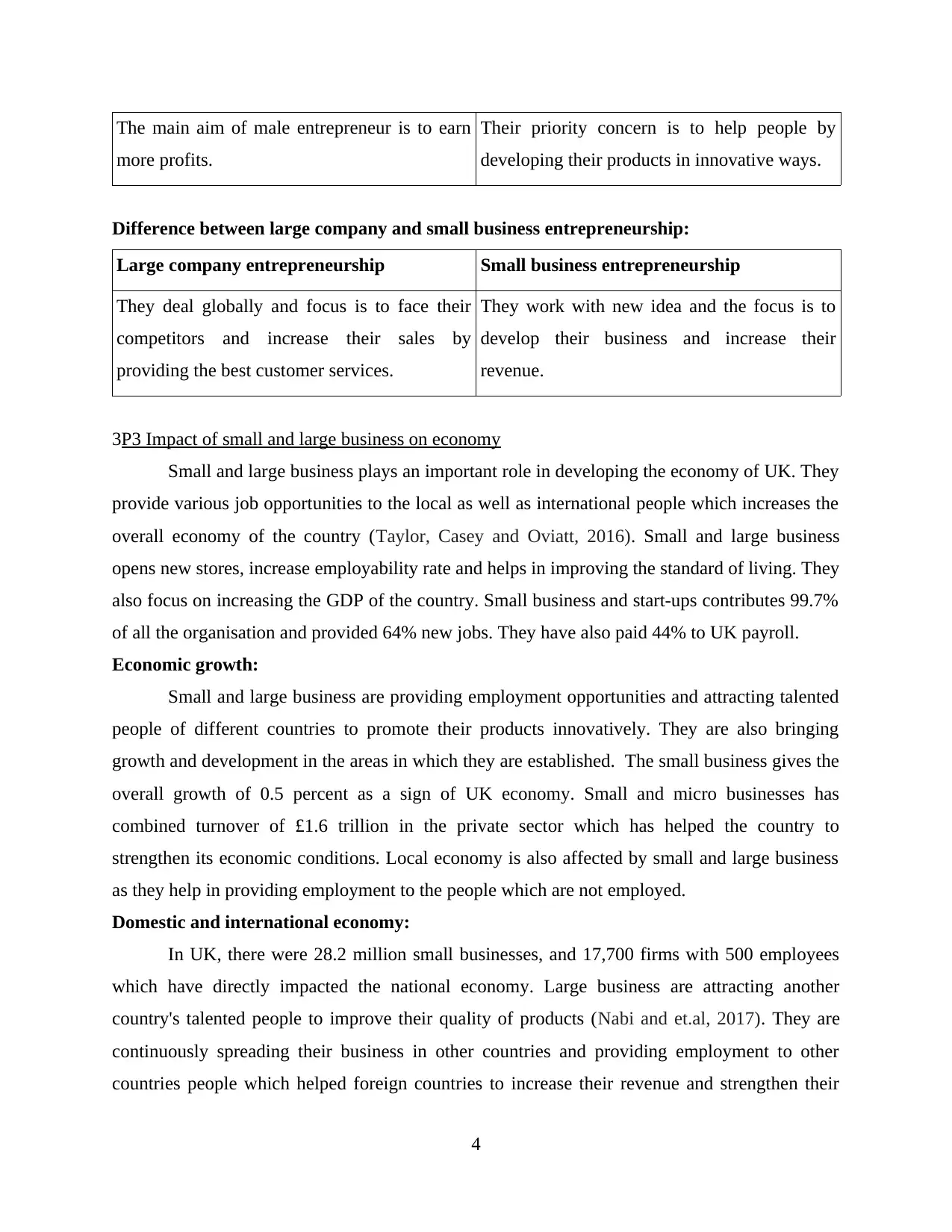
The main aim of male entrepreneur is to earn
more profits.
Their priority concern is to help people by
developing their products in innovative ways.
Difference between large company and small business entrepreneurship:
Large company entrepreneurship Small business entrepreneurship
They deal globally and focus is to face their
competitors and increase their sales by
providing the best customer services.
They work with new idea and the focus is to
develop their business and increase their
revenue.
3P3 Impact of small and large business on economy
Small and large business plays an important role in developing the economy of UK. They
provide various job opportunities to the local as well as international people which increases the
overall economy of the country (Taylor, Casey and Oviatt, 2016). Small and large business
opens new stores, increase employability rate and helps in improving the standard of living. They
also focus on increasing the GDP of the country. Small business and start-ups contributes 99.7%
of all the organisation and provided 64% new jobs. They have also paid 44% to UK payroll.
Economic growth:
Small and large business are providing employment opportunities and attracting talented
people of different countries to promote their products innovatively. They are also bringing
growth and development in the areas in which they are established. The small business gives the
overall growth of 0.5 percent as a sign of UK economy. Small and micro businesses has
combined turnover of £1.6 trillion in the private sector which has helped the country to
strengthen its economic conditions. Local economy is also affected by small and large business
as they help in providing employment to the people which are not employed.
Domestic and international economy:
In UK, there were 28.2 million small businesses, and 17,700 firms with 500 employees
which have directly impacted the national economy. Large business are attracting another
country's talented people to improve their quality of products (Nabi and et.al, 2017). They are
continuously spreading their business in other countries and providing employment to other
countries people which helped foreign countries to increase their revenue and strengthen their
4
more profits.
Their priority concern is to help people by
developing their products in innovative ways.
Difference between large company and small business entrepreneurship:
Large company entrepreneurship Small business entrepreneurship
They deal globally and focus is to face their
competitors and increase their sales by
providing the best customer services.
They work with new idea and the focus is to
develop their business and increase their
revenue.
3P3 Impact of small and large business on economy
Small and large business plays an important role in developing the economy of UK. They
provide various job opportunities to the local as well as international people which increases the
overall economy of the country (Taylor, Casey and Oviatt, 2016). Small and large business
opens new stores, increase employability rate and helps in improving the standard of living. They
also focus on increasing the GDP of the country. Small business and start-ups contributes 99.7%
of all the organisation and provided 64% new jobs. They have also paid 44% to UK payroll.
Economic growth:
Small and large business are providing employment opportunities and attracting talented
people of different countries to promote their products innovatively. They are also bringing
growth and development in the areas in which they are established. The small business gives the
overall growth of 0.5 percent as a sign of UK economy. Small and micro businesses has
combined turnover of £1.6 trillion in the private sector which has helped the country to
strengthen its economic conditions. Local economy is also affected by small and large business
as they help in providing employment to the people which are not employed.
Domestic and international economy:
In UK, there were 28.2 million small businesses, and 17,700 firms with 500 employees
which have directly impacted the national economy. Large business are attracting another
country's talented people to improve their quality of products (Nabi and et.al, 2017). They are
continuously spreading their business in other countries and providing employment to other
countries people which helped foreign countries to increase their revenue and strengthen their
4
⊘ This is a preview!⊘
Do you want full access?
Subscribe today to unlock all pages.

Trusted by 1+ million students worldwide
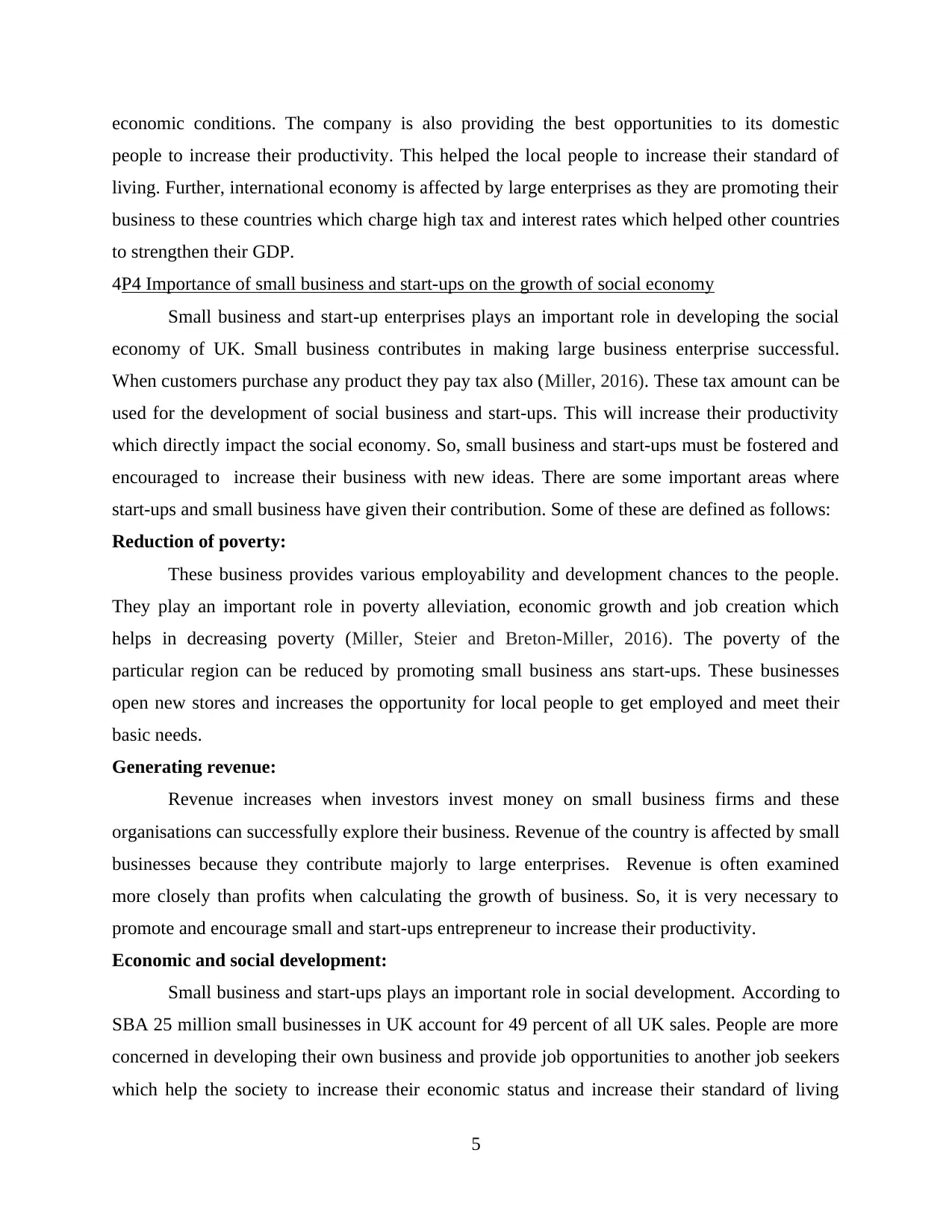
economic conditions. The company is also providing the best opportunities to its domestic
people to increase their productivity. This helped the local people to increase their standard of
living. Further, international economy is affected by large enterprises as they are promoting their
business to these countries which charge high tax and interest rates which helped other countries
to strengthen their GDP.
4P4 Importance of small business and start-ups on the growth of social economy
Small business and start-up enterprises plays an important role in developing the social
economy of UK. Small business contributes in making large business enterprise successful.
When customers purchase any product they pay tax also (Miller, 2016). These tax amount can be
used for the development of social business and start-ups. This will increase their productivity
which directly impact the social economy. So, small business and start-ups must be fostered and
encouraged to increase their business with new ideas. There are some important areas where
start-ups and small business have given their contribution. Some of these are defined as follows:
Reduction of poverty:
These business provides various employability and development chances to the people.
They play an important role in poverty alleviation, economic growth and job creation which
helps in decreasing poverty (Miller, Steier and Breton‐Miller, 2016). The poverty of the
particular region can be reduced by promoting small business ans start-ups. These businesses
open new stores and increases the opportunity for local people to get employed and meet their
basic needs.
Generating revenue:
Revenue increases when investors invest money on small business firms and these
organisations can successfully explore their business. Revenue of the country is affected by small
businesses because they contribute majorly to large enterprises. Revenue is often examined
more closely than profits when calculating the growth of business. So, it is very necessary to
promote and encourage small and start-ups entrepreneur to increase their productivity.
Economic and social development:
Small business and start-ups plays an important role in social development. According to
SBA 25 million small businesses in UK account for 49 percent of all UK sales. People are more
concerned in developing their own business and provide job opportunities to another job seekers
which help the society to increase their economic status and increase their standard of living
5
people to increase their productivity. This helped the local people to increase their standard of
living. Further, international economy is affected by large enterprises as they are promoting their
business to these countries which charge high tax and interest rates which helped other countries
to strengthen their GDP.
4P4 Importance of small business and start-ups on the growth of social economy
Small business and start-up enterprises plays an important role in developing the social
economy of UK. Small business contributes in making large business enterprise successful.
When customers purchase any product they pay tax also (Miller, 2016). These tax amount can be
used for the development of social business and start-ups. This will increase their productivity
which directly impact the social economy. So, small business and start-ups must be fostered and
encouraged to increase their business with new ideas. There are some important areas where
start-ups and small business have given their contribution. Some of these are defined as follows:
Reduction of poverty:
These business provides various employability and development chances to the people.
They play an important role in poverty alleviation, economic growth and job creation which
helps in decreasing poverty (Miller, Steier and Breton‐Miller, 2016). The poverty of the
particular region can be reduced by promoting small business ans start-ups. These businesses
open new stores and increases the opportunity for local people to get employed and meet their
basic needs.
Generating revenue:
Revenue increases when investors invest money on small business firms and these
organisations can successfully explore their business. Revenue of the country is affected by small
businesses because they contribute majorly to large enterprises. Revenue is often examined
more closely than profits when calculating the growth of business. So, it is very necessary to
promote and encourage small and start-ups entrepreneur to increase their productivity.
Economic and social development:
Small business and start-ups plays an important role in social development. According to
SBA 25 million small businesses in UK account for 49 percent of all UK sales. People are more
concerned in developing their own business and provide job opportunities to another job seekers
which help the society to increase their economic status and increase their standard of living
5
Paraphrase This Document
Need a fresh take? Get an instant paraphrase of this document with our AI Paraphraser
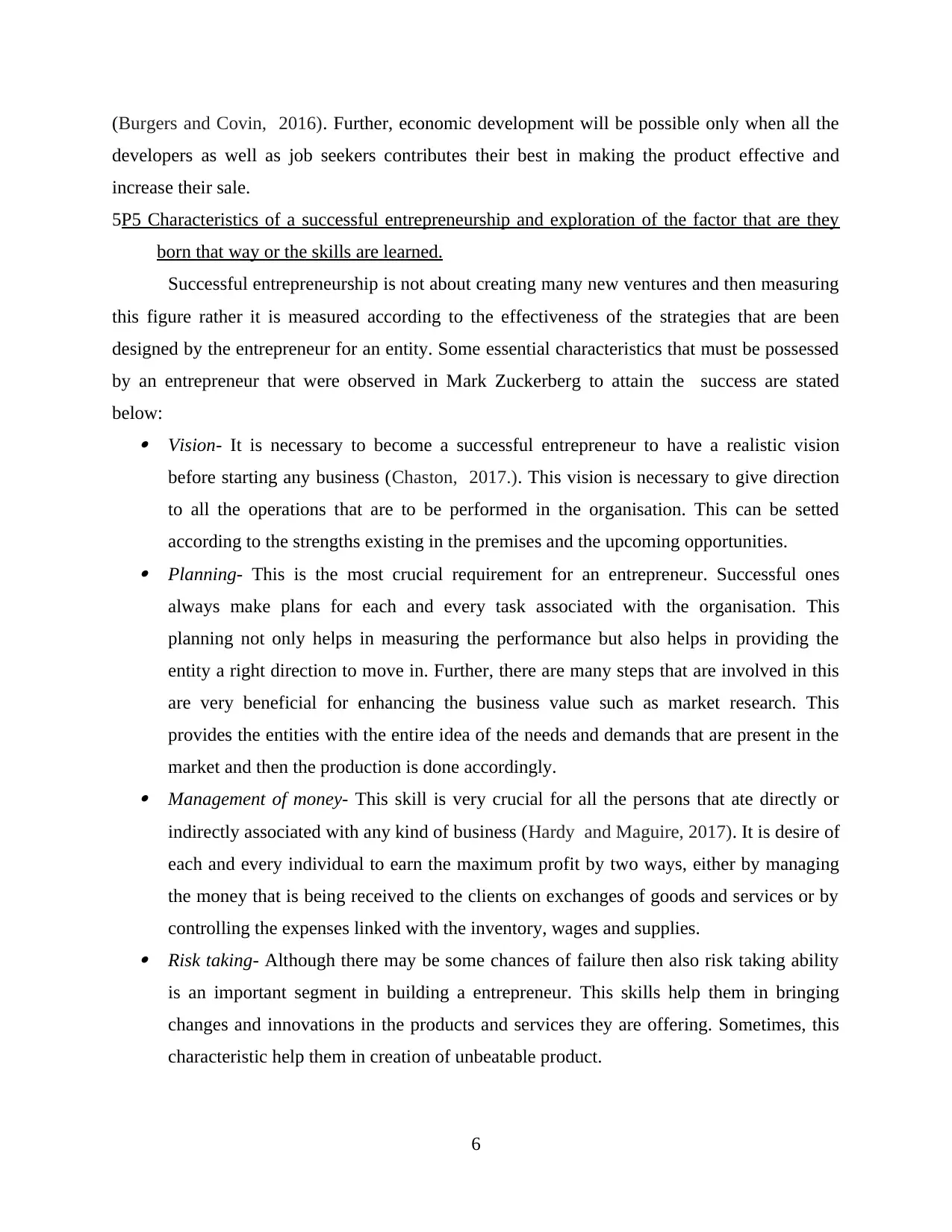
(Burgers and Covin, 2016). Further, economic development will be possible only when all the
developers as well as job seekers contributes their best in making the product effective and
increase their sale.
5P5 Characteristics of a successful entrepreneurship and exploration of the factor that are they
born that way or the skills are learned.
Successful entrepreneurship is not about creating many new ventures and then measuring
this figure rather it is measured according to the effectiveness of the strategies that are been
designed by the entrepreneur for an entity. Some essential characteristics that must be possessed
by an entrepreneur that were observed in Mark Zuckerberg to attain the success are stated
below: Vision- It is necessary to become a successful entrepreneur to have a realistic vision
before starting any business (Chaston, 2017.). This vision is necessary to give direction
to all the operations that are to be performed in the organisation. This can be setted
according to the strengths existing in the premises and the upcoming opportunities. Planning- This is the most crucial requirement for an entrepreneur. Successful ones
always make plans for each and every task associated with the organisation. This
planning not only helps in measuring the performance but also helps in providing the
entity a right direction to move in. Further, there are many steps that are involved in this
are very beneficial for enhancing the business value such as market research. This
provides the entities with the entire idea of the needs and demands that are present in the
market and then the production is done accordingly. Management of money- This skill is very crucial for all the persons that ate directly or
indirectly associated with any kind of business (Hardy and Maguire, 2017). It is desire of
each and every individual to earn the maximum profit by two ways, either by managing
the money that is being received to the clients on exchanges of goods and services or by
controlling the expenses linked with the inventory, wages and supplies. Risk taking- Although there may be some chances of failure then also risk taking ability
is an important segment in building a entrepreneur. This skills help them in bringing
changes and innovations in the products and services they are offering. Sometimes, this
characteristic help them in creation of unbeatable product.
6
developers as well as job seekers contributes their best in making the product effective and
increase their sale.
5P5 Characteristics of a successful entrepreneurship and exploration of the factor that are they
born that way or the skills are learned.
Successful entrepreneurship is not about creating many new ventures and then measuring
this figure rather it is measured according to the effectiveness of the strategies that are been
designed by the entrepreneur for an entity. Some essential characteristics that must be possessed
by an entrepreneur that were observed in Mark Zuckerberg to attain the success are stated
below: Vision- It is necessary to become a successful entrepreneur to have a realistic vision
before starting any business (Chaston, 2017.). This vision is necessary to give direction
to all the operations that are to be performed in the organisation. This can be setted
according to the strengths existing in the premises and the upcoming opportunities. Planning- This is the most crucial requirement for an entrepreneur. Successful ones
always make plans for each and every task associated with the organisation. This
planning not only helps in measuring the performance but also helps in providing the
entity a right direction to move in. Further, there are many steps that are involved in this
are very beneficial for enhancing the business value such as market research. This
provides the entities with the entire idea of the needs and demands that are present in the
market and then the production is done accordingly. Management of money- This skill is very crucial for all the persons that ate directly or
indirectly associated with any kind of business (Hardy and Maguire, 2017). It is desire of
each and every individual to earn the maximum profit by two ways, either by managing
the money that is being received to the clients on exchanges of goods and services or by
controlling the expenses linked with the inventory, wages and supplies. Risk taking- Although there may be some chances of failure then also risk taking ability
is an important segment in building a entrepreneur. This skills help them in bringing
changes and innovations in the products and services they are offering. Sometimes, this
characteristic help them in creation of unbeatable product.
6

Self-belief- A key entrepreneurial trait is to keep confidence in self. This confidence helps
an entrepreneur in moving consistently in order to achieve the organisational goals. This
trait also enhance the risk taking edge of an individual.
Building relationships- A successful entrepreneur always possess good relations that can
aid in his value building (Dana, , Grandinetti and Mason, 2016). This tool is very
effective as it enhance the upcoming opportunities to the business. Further, these relations
also helps in solving so many problems of the organisation.
Thus, these are some common traits that a successful entrepreneur keeps and the ones
who are seeking to be successful can adopt them in their functions. Further, it should be noted
that these traits are not necessarily available in all the entrepreneur from the birth time. All these
traits can be learned with time. These skills may be gained by observing an inspirational
entrepreneur, by attending seminars on relevant topics, etc.
6 P6 Assess the role of personality in entrepreneurial motivation and mindset.
Motivation and mindset are two important factors that highly impacts upon the
entrepreneurship. These factors further depends upon some elements such as family upbringing,
lifestyle, cultural differences and personal motivation. The most discussed entrepreneur in that
workshop was Mark Zuckerberg, thus the impact of these factors will be explained in context of
him as follows: Family Upbringing- It is the first place from where any person gets trained. Family
upbringing of any person states about his moral and values (Storey, 2016). These
elements thus plays a vital role in developing motivation of an entrepreneur. If the
upbringing was done in right way then he/she will have the abilities to face failures but if
it is feeble then the he will easily lose the hope. Family support is all that an entrepreneur
needs to become successful. In case of Mark Zuckerberg, his family always supported in
his dreams. His father was his first teacher who taught him basics of programming.
Further, his spouse always backed his decisions. Lifestyle- Lifestyle of a person states so much about his buying and selling nature.
Further, lifestyle keeps them motivated in order to maintain their living standard. This
need of leisures motivate them to work harder so that they can attain them all.
7
an entrepreneur in moving consistently in order to achieve the organisational goals. This
trait also enhance the risk taking edge of an individual.
Building relationships- A successful entrepreneur always possess good relations that can
aid in his value building (Dana, , Grandinetti and Mason, 2016). This tool is very
effective as it enhance the upcoming opportunities to the business. Further, these relations
also helps in solving so many problems of the organisation.
Thus, these are some common traits that a successful entrepreneur keeps and the ones
who are seeking to be successful can adopt them in their functions. Further, it should be noted
that these traits are not necessarily available in all the entrepreneur from the birth time. All these
traits can be learned with time. These skills may be gained by observing an inspirational
entrepreneur, by attending seminars on relevant topics, etc.
6 P6 Assess the role of personality in entrepreneurial motivation and mindset.
Motivation and mindset are two important factors that highly impacts upon the
entrepreneurship. These factors further depends upon some elements such as family upbringing,
lifestyle, cultural differences and personal motivation. The most discussed entrepreneur in that
workshop was Mark Zuckerberg, thus the impact of these factors will be explained in context of
him as follows: Family Upbringing- It is the first place from where any person gets trained. Family
upbringing of any person states about his moral and values (Storey, 2016). These
elements thus plays a vital role in developing motivation of an entrepreneur. If the
upbringing was done in right way then he/she will have the abilities to face failures but if
it is feeble then the he will easily lose the hope. Family support is all that an entrepreneur
needs to become successful. In case of Mark Zuckerberg, his family always supported in
his dreams. His father was his first teacher who taught him basics of programming.
Further, his spouse always backed his decisions. Lifestyle- Lifestyle of a person states so much about his buying and selling nature.
Further, lifestyle keeps them motivated in order to maintain their living standard. This
need of leisures motivate them to work harder so that they can attain them all.
7
⊘ This is a preview!⊘
Do you want full access?
Subscribe today to unlock all pages.

Trusted by 1+ million students worldwide
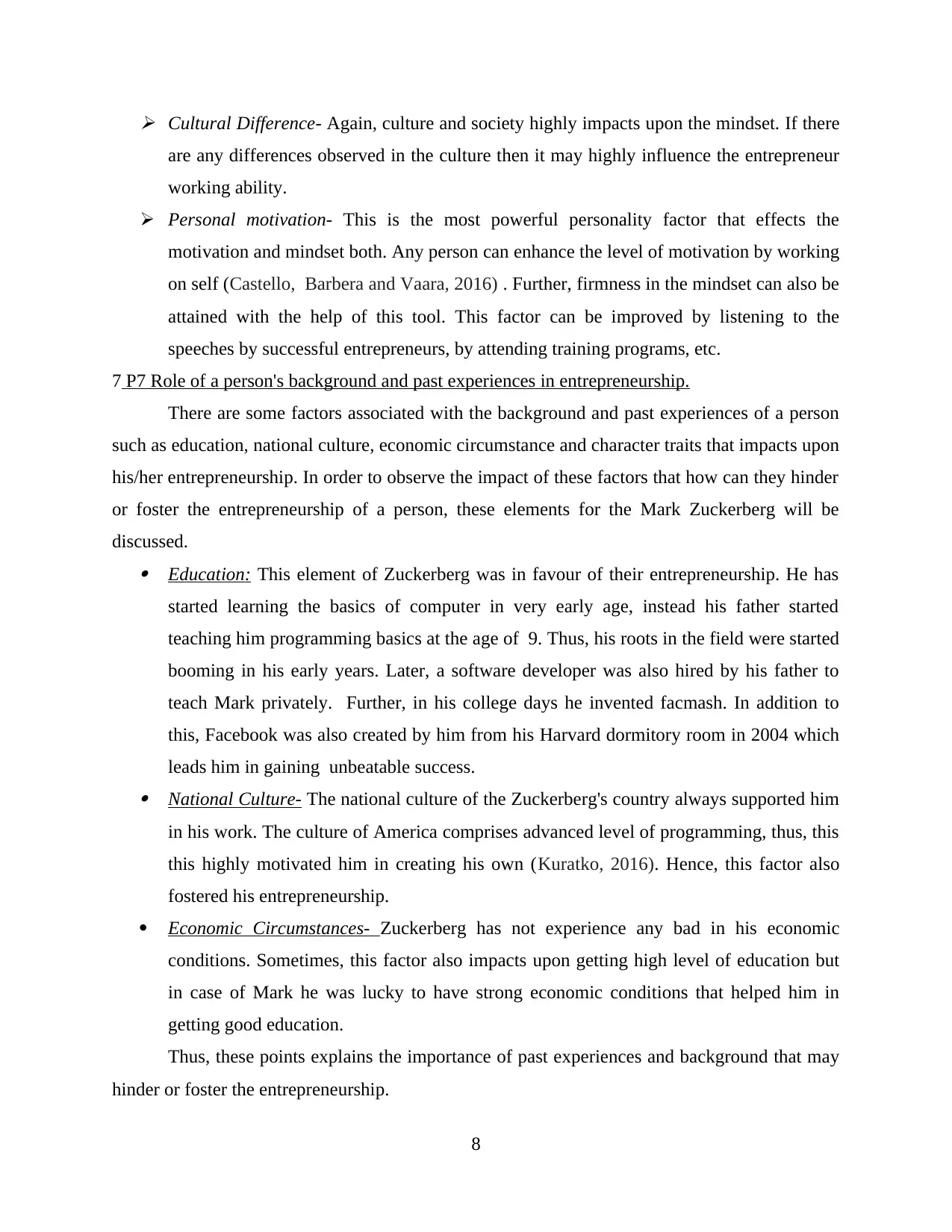
Cultural Difference- Again, culture and society highly impacts upon the mindset. If there
are any differences observed in the culture then it may highly influence the entrepreneur
working ability.
Personal motivation- This is the most powerful personality factor that effects the
motivation and mindset both. Any person can enhance the level of motivation by working
on self (Castello, Barbera and Vaara, 2016) . Further, firmness in the mindset can also be
attained with the help of this tool. This factor can be improved by listening to the
speeches by successful entrepreneurs, by attending training programs, etc.
7 P7 Role of a person's background and past experiences in entrepreneurship.
There are some factors associated with the background and past experiences of a person
such as education, national culture, economic circumstance and character traits that impacts upon
his/her entrepreneurship. In order to observe the impact of these factors that how can they hinder
or foster the entrepreneurship of a person, these elements for the Mark Zuckerberg will be
discussed. Education: This element of Zuckerberg was in favour of their entrepreneurship. He has
started learning the basics of computer in very early age, instead his father started
teaching him programming basics at the age of 9. Thus, his roots in the field were started
booming in his early years. Later, a software developer was also hired by his father to
teach Mark privately. Further, in his college days he invented facmash. In addition to
this, Facebook was also created by him from his Harvard dormitory room in 2004 which
leads him in gaining unbeatable success. National Culture- The national culture of the Zuckerberg's country always supported him
in his work. The culture of America comprises advanced level of programming, thus, this
this highly motivated him in creating his own (Kuratko, 2016). Hence, this factor also
fostered his entrepreneurship.
Economic Circumstances- Zuckerberg has not experience any bad in his economic
conditions. Sometimes, this factor also impacts upon getting high level of education but
in case of Mark he was lucky to have strong economic conditions that helped him in
getting good education.
Thus, these points explains the importance of past experiences and background that may
hinder or foster the entrepreneurship.
8
are any differences observed in the culture then it may highly influence the entrepreneur
working ability.
Personal motivation- This is the most powerful personality factor that effects the
motivation and mindset both. Any person can enhance the level of motivation by working
on self (Castello, Barbera and Vaara, 2016) . Further, firmness in the mindset can also be
attained with the help of this tool. This factor can be improved by listening to the
speeches by successful entrepreneurs, by attending training programs, etc.
7 P7 Role of a person's background and past experiences in entrepreneurship.
There are some factors associated with the background and past experiences of a person
such as education, national culture, economic circumstance and character traits that impacts upon
his/her entrepreneurship. In order to observe the impact of these factors that how can they hinder
or foster the entrepreneurship of a person, these elements for the Mark Zuckerberg will be
discussed. Education: This element of Zuckerberg was in favour of their entrepreneurship. He has
started learning the basics of computer in very early age, instead his father started
teaching him programming basics at the age of 9. Thus, his roots in the field were started
booming in his early years. Later, a software developer was also hired by his father to
teach Mark privately. Further, in his college days he invented facmash. In addition to
this, Facebook was also created by him from his Harvard dormitory room in 2004 which
leads him in gaining unbeatable success. National Culture- The national culture of the Zuckerberg's country always supported him
in his work. The culture of America comprises advanced level of programming, thus, this
this highly motivated him in creating his own (Kuratko, 2016). Hence, this factor also
fostered his entrepreneurship.
Economic Circumstances- Zuckerberg has not experience any bad in his economic
conditions. Sometimes, this factor also impacts upon getting high level of education but
in case of Mark he was lucky to have strong economic conditions that helped him in
getting good education.
Thus, these points explains the importance of past experiences and background that may
hinder or foster the entrepreneurship.
8
Paraphrase This Document
Need a fresh take? Get an instant paraphrase of this document with our AI Paraphraser
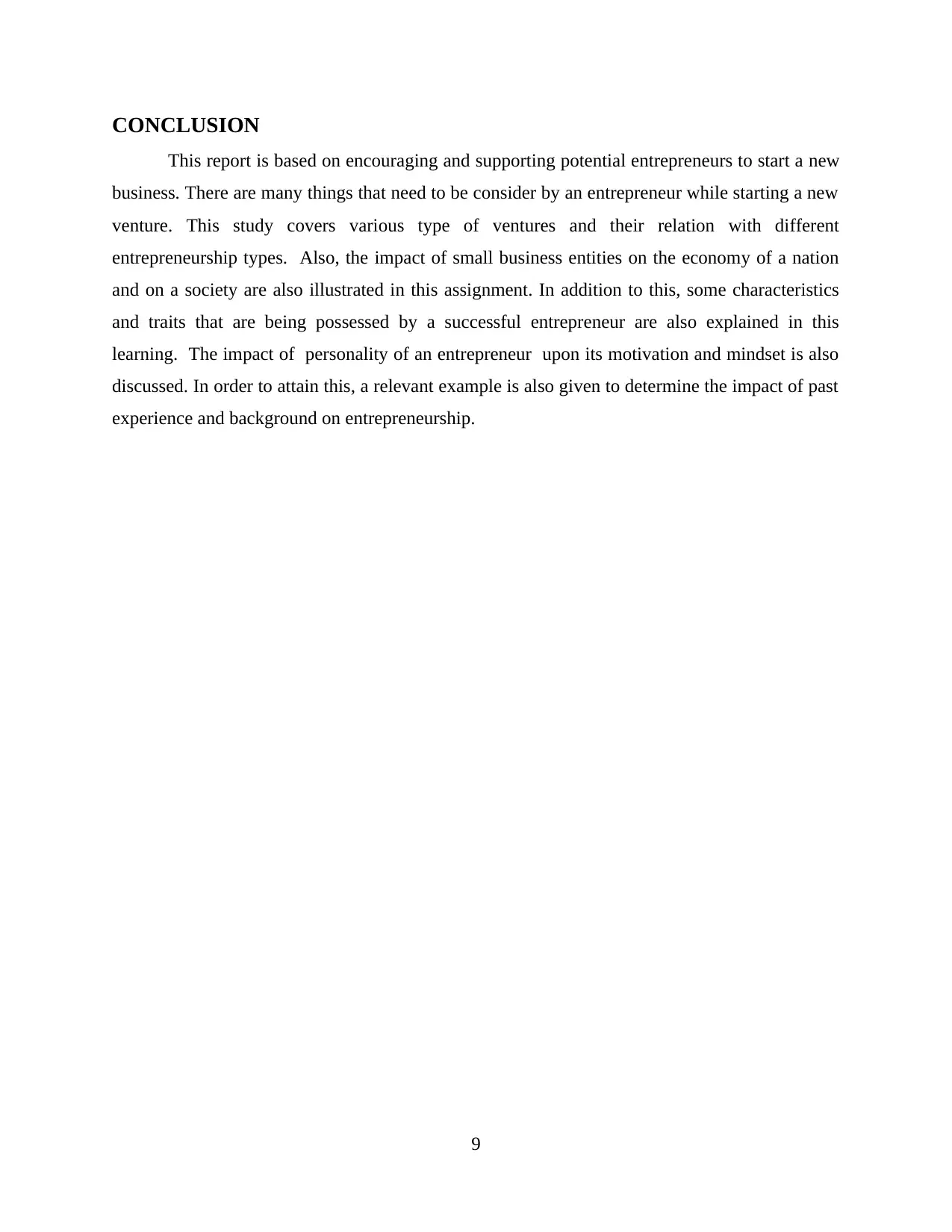
CONCLUSION
This report is based on encouraging and supporting potential entrepreneurs to start a new
business. There are many things that need to be consider by an entrepreneur while starting a new
venture. This study covers various type of ventures and their relation with different
entrepreneurship types. Also, the impact of small business entities on the economy of a nation
and on a society are also illustrated in this assignment. In addition to this, some characteristics
and traits that are being possessed by a successful entrepreneur are also explained in this
learning. The impact of personality of an entrepreneur upon its motivation and mindset is also
discussed. In order to attain this, a relevant example is also given to determine the impact of past
experience and background on entrepreneurship.
9
This report is based on encouraging and supporting potential entrepreneurs to start a new
business. There are many things that need to be consider by an entrepreneur while starting a new
venture. This study covers various type of ventures and their relation with different
entrepreneurship types. Also, the impact of small business entities on the economy of a nation
and on a society are also illustrated in this assignment. In addition to this, some characteristics
and traits that are being possessed by a successful entrepreneur are also explained in this
learning. The impact of personality of an entrepreneur upon its motivation and mindset is also
discussed. In order to attain this, a relevant example is also given to determine the impact of past
experience and background on entrepreneurship.
9
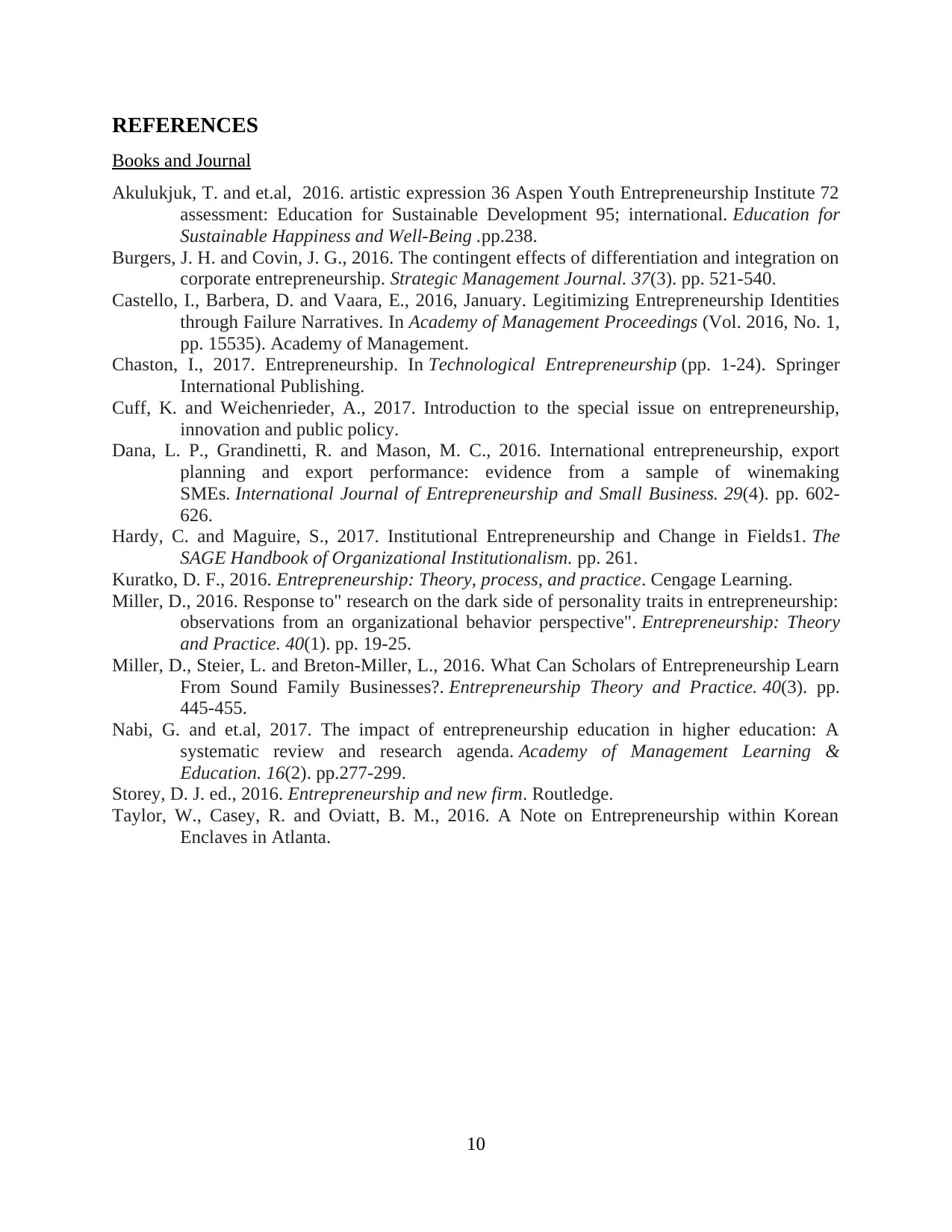
REFERENCES
Books and Journal
Akulukjuk, T. and et.al, 2016. artistic expression 36 Aspen Youth Entrepreneurship Institute 72
assessment: Education for Sustainable Development 95; international. Education for
Sustainable Happiness and Well-Being .pp.238.
Burgers, J. H. and Covin, J. G., 2016. The contingent effects of differentiation and integration on
corporate entrepreneurship. Strategic Management Journal. 37(3). pp. 521-540.
Castello, I., Barbera, D. and Vaara, E., 2016, January. Legitimizing Entrepreneurship Identities
through Failure Narratives. In Academy of Management Proceedings (Vol. 2016, No. 1,
pp. 15535). Academy of Management.
Chaston, I., 2017. Entrepreneurship. In Technological Entrepreneurship (pp. 1-24). Springer
International Publishing.
Cuff, K. and Weichenrieder, A., 2017. Introduction to the special issue on entrepreneurship,
innovation and public policy.
Dana, L. P., Grandinetti, R. and Mason, M. C., 2016. International entrepreneurship, export
planning and export performance: evidence from a sample of winemaking
SMEs. International Journal of Entrepreneurship and Small Business. 29(4). pp. 602-
626.
Hardy, C. and Maguire, S., 2017. Institutional Entrepreneurship and Change in Fields1. The
SAGE Handbook of Organizational Institutionalism. pp. 261.
Kuratko, D. F., 2016. Entrepreneurship: Theory, process, and practice. Cengage Learning.
Miller, D., 2016. Response to" research on the dark side of personality traits in entrepreneurship:
observations from an organizational behavior perspective". Entrepreneurship: Theory
and Practice. 40(1). pp. 19-25.
Miller, D., Steier, L. and Breton‐Miller, L., 2016. What Can Scholars of Entrepreneurship Learn
From Sound Family Businesses?. Entrepreneurship Theory and Practice. 40(3). pp.
445-455.
Nabi, G. and et.al, 2017. The impact of entrepreneurship education in higher education: A
systematic review and research agenda. Academy of Management Learning &
Education. 16(2). pp.277-299.
Storey, D. J. ed., 2016. Entrepreneurship and new firm. Routledge.
Taylor, W., Casey, R. and Oviatt, B. M., 2016. A Note on Entrepreneurship within Korean
Enclaves in Atlanta.
10
Books and Journal
Akulukjuk, T. and et.al, 2016. artistic expression 36 Aspen Youth Entrepreneurship Institute 72
assessment: Education for Sustainable Development 95; international. Education for
Sustainable Happiness and Well-Being .pp.238.
Burgers, J. H. and Covin, J. G., 2016. The contingent effects of differentiation and integration on
corporate entrepreneurship. Strategic Management Journal. 37(3). pp. 521-540.
Castello, I., Barbera, D. and Vaara, E., 2016, January. Legitimizing Entrepreneurship Identities
through Failure Narratives. In Academy of Management Proceedings (Vol. 2016, No. 1,
pp. 15535). Academy of Management.
Chaston, I., 2017. Entrepreneurship. In Technological Entrepreneurship (pp. 1-24). Springer
International Publishing.
Cuff, K. and Weichenrieder, A., 2017. Introduction to the special issue on entrepreneurship,
innovation and public policy.
Dana, L. P., Grandinetti, R. and Mason, M. C., 2016. International entrepreneurship, export
planning and export performance: evidence from a sample of winemaking
SMEs. International Journal of Entrepreneurship and Small Business. 29(4). pp. 602-
626.
Hardy, C. and Maguire, S., 2017. Institutional Entrepreneurship and Change in Fields1. The
SAGE Handbook of Organizational Institutionalism. pp. 261.
Kuratko, D. F., 2016. Entrepreneurship: Theory, process, and practice. Cengage Learning.
Miller, D., 2016. Response to" research on the dark side of personality traits in entrepreneurship:
observations from an organizational behavior perspective". Entrepreneurship: Theory
and Practice. 40(1). pp. 19-25.
Miller, D., Steier, L. and Breton‐Miller, L., 2016. What Can Scholars of Entrepreneurship Learn
From Sound Family Businesses?. Entrepreneurship Theory and Practice. 40(3). pp.
445-455.
Nabi, G. and et.al, 2017. The impact of entrepreneurship education in higher education: A
systematic review and research agenda. Academy of Management Learning &
Education. 16(2). pp.277-299.
Storey, D. J. ed., 2016. Entrepreneurship and new firm. Routledge.
Taylor, W., Casey, R. and Oviatt, B. M., 2016. A Note on Entrepreneurship within Korean
Enclaves in Atlanta.
10
⊘ This is a preview!⊘
Do you want full access?
Subscribe today to unlock all pages.

Trusted by 1+ million students worldwide
1 out of 13
Related Documents
Your All-in-One AI-Powered Toolkit for Academic Success.
+13062052269
info@desklib.com
Available 24*7 on WhatsApp / Email
![[object Object]](/_next/static/media/star-bottom.7253800d.svg)
Unlock your academic potential
Copyright © 2020–2026 A2Z Services. All Rights Reserved. Developed and managed by ZUCOL.




